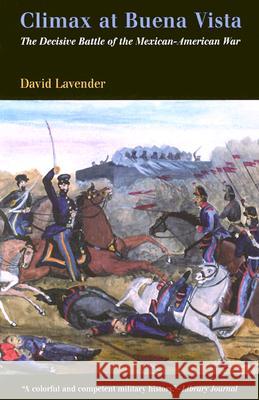Climax at Buena Vista: The Decisive Battle of the Mexican-American War » książka
Climax at Buena Vista: The Decisive Battle of the Mexican-American War
ISBN-13: 9780812218602 / Angielski / Miękka / 2003 / 256 str.
The ferocity and magnitude of the American Civil War eclipses that of all other nineteenth-century conflicts, but the hard fighting and tactics that played out between the North and South were first developed during the Mexican-American War of the late 1840s. It was during this struggle between two regional powers that the United States showed that it could muster soldiers representing far-flung states of the Union--Illinois, Indiana, Kentucky, Arkansas, and Mississippi--and officers fresh from West Point, testing the military preparedness of the young nation. In Climax at Buena Vista, David Lavender tells the complete story of the turning point in the Mexican-American War. In an effort to secure Texas firmly as a state, the United States declared war on Mexico and launched an invasion, including an effort to capture Mexico City from the north and from the coast. The American plans fell short, however, and attempts were made to achieve a decisive victory through shifting troops to various points of attack. This strategy depleted the forces led by General Zachary Taylor, and in February 1847, near the small outpost of Buena Vista, he and his roughly 4,500 regulars found themselves facing an army of more than 20,000 Mexican soldiers led by General Antonio Lopez de Santa Anna. What should have been a rout ended up in a draw, with the American troops maneuvering quickly and regrouping in order to keep the surrounding Mexican troops from completely overrunning their position. Santa Anna was forced to withdraw and, with the Mexican forces demoralized, the Americans were able to reignite the offensive and ultimately force Mexico to sue for peace. David Lavender's acclaimed account of this battle allows the reader to understand the complex and confusing movements of the opposing forces, and it places the war in the greater American political context, where huge territories were acquired and future presidents groomed.
The ferocity and magnitude of the American Civil War eclipses that of all other nineteenth-century conflicts, but the hard fighting and tactics that played out between the North and South were first developed during the Mexican-American War of the late 1840s. It was during this struggle between two regional powers that the United States showed that it could muster soldiers representing far-flung states of the Union--Illinois, Indiana, Kentucky, Arkansas, and Mississippi--and officers fresh from West Point, testing the military preparedness of the young nation.In Climax at Buena Vista, David Lavender tells the complete story of the turning point in the Mexican-American War. In an effort to secure Texas firmly as a state, the United States declared war on Mexico and launched an invasion, including an effort to capture Mexico City from the north and from the coast. The American plans fell short, however, and attempts were made to achieve a decisive victory through shifting troops to various points of attack.This strategy depleted the forces led by General Zachary Taylor, and in February 1847, near the small outpost of Buena Vista, he and his roughly 4,500 regulars found themselves facing an army of more than 20,000 Mexican soldiers led by General Antonio López de Santa Anna. What should have been a rout ended up in a draw, with the American troops maneuvering quickly and regrouping in order to keep the surrounding Mexican troops from completely overrunning their position. Santa Anna was forced to withdraw and, with the Mexican forces demoralized, the Americans were able to reignite the offensive and ultimately force Mexico to sue for peace.David Lavenders acclaimed account of this battle allows the reader to understand the complex and confusing movements of the opposing forces, and it places the war in the greater American political context, where huge territories were acquired and future presidents groomed.











